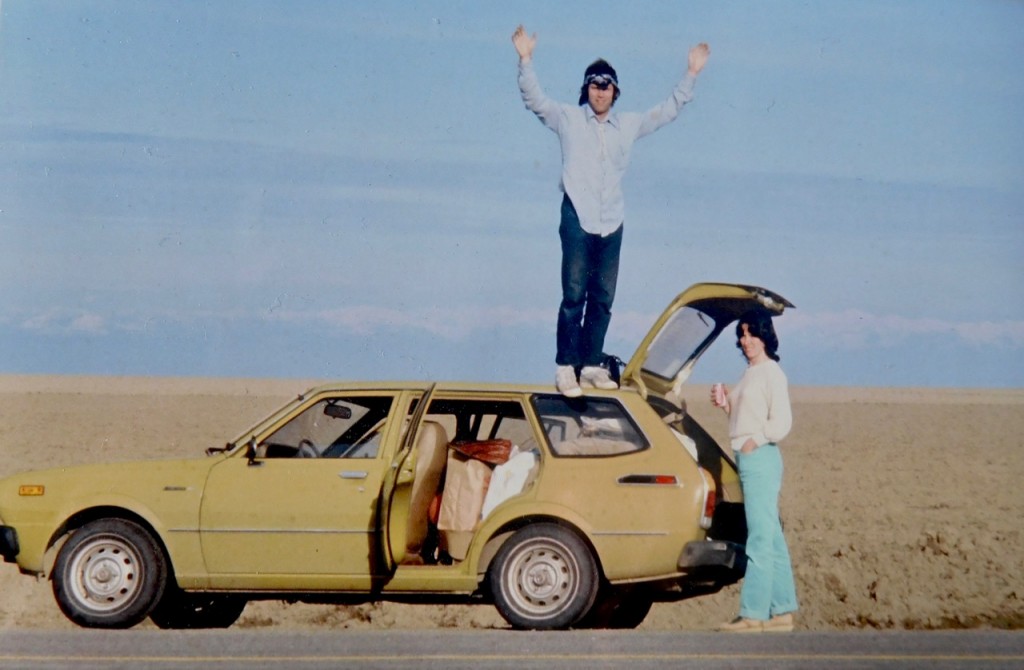Going Out Into the World: a screenplay for a short movie
The film begins with a slow fade to a close-up of a foggy mirror transected by runaway drops of water.
Now we see Margot’s blurred form behind a steamy translucent shower curtain hanging down into a claw-foot bathtub.
A woman in her forties, Margot turns off the water and reaches out from behind the shower curtain to fetch a large white towel hanging from a hook on the wall. She wraps the towel around her so she is covered from her armpits down to a few inches above her knees. She opens the shower curtain, steps out of the tub, and stands before the foggy mirror.
Using a small hand towel, she clears a patch of the mirror, her expression revealing a subtle disquiet.
“We can do this, Margot,” she says, longingly. “We can go out. With Sara’s help. We can. Please?”
The camera lingers on her reflection as she takes a deep breath and the scene dissolves to her bedroom where muted morning sunlight slants through a south-facing window.
A large framed print of Picasso’s Three Musicians is centered on the wall opposite her queen-sized bed, the linens gray, the comforter white.
Wearing a white blouse and black underwear, Margot stands at the foot of her bed and looks down at a trio of long skirts assembled there: black, brown, and red. She picks up the black skirt, muses for a moment, puts the black skirt down and takes up the red skirt as the scene dissolves to her standing in her tidy kitchen wearing the white blouse tucked into black trousers.
Margot’s two cats, a calico and a black, swirl around her bare feet.
Margot fills two small bowls with dry cat food, sets the bowls on the floor by the back door, and as her cats rush to eat, she smiles for the first time.
“Bon appetite, my darlings,” she says softly.
With slow deliberate movements, Margot fills a kettle with water and puts the kettle on the stove, opens a cupboard, and gets out a dark green teapot. She measures loose black tea into the teapot and the scene dissolves to her sitting at a small table in the dining nook of the kitchen. She sips her cup of tea and pets the black cat on her lap, the calico sitting on a nearby chair.
“Sara is coming today,” she says, speaking to her cats. “We might go to a café.” She sets her cup down and clasps her hands to suppress her panic. “But maybe not. Next week might be better because… because by then…” She frowns and shakes her head. “No. I need to go out today. I… I… it’s time. I need to.”
The doorbell sounds and Margot freezes for a moment before she picks up the black cat and sets him on the floor. Now she rises as the doorbell sounds again and the scene dissolves to Margot standing a few feet from her front door, waiting for the doorbell to sound again.
Someone knocks. “Margot? It’s Sara. Are you there?”
“I’m not feeling well,” says Margot, fighting panic. “I have a terrible headache. I think I’m coming down with something. I wouldn’t want you to catch this, Sara. I think it might have gotten into my lungs.”
Sara’s Voice: Open up, dear. I won’t catch anything.
Margot: No, I… I think it would be better if we waited another week before we go out. I’m still… I’m still… I’m not sure I can do this.
Sara’s Voice: Well whether we go out or not, you can let me in, can’t you?
Margot: You won’t be angry with me if we don’t go out?
Sara’s Voice: I will not be angry with you. I promise.
Margot opens the door and here is Sara, a woman in her thirties, her hair tied back in a ponytail. She is wearing a black jacket over a blue shirt, a black skirt that comes to her knees, and running shoes.
Margot: Come in. I’ll make a fresh pot of tea.
Sara: (entering) What about going out for tea? Like we planned?
Margot: I don’t think I’m ready, Sara. I’m sorry, I just… I’m still too afraid.
Sara: But that’s why we want to go out. So you can get over your fear.
Margot: I know, but… I’m not ready.
Sara follows Margot into the kitchen. “How about this? How about you get your shoes on and we walk to the end of the block, and if you don’t want to go any further, we’ll come back.”
Margot considers this. “We would just go to the end of the block?”
“If that’s as far as you want to go, yeah.” Sara nods pleasantly. “Just a little going out into the world, that’s all.”
“Okay,” says Margot, both excited and anxious. “I’ll get my shoes on.”
Now we have a view of the front of Margot’s house, a bungalow with a walkway leading from the front door through a garden to the sidewalk, the neighborhood composed of other small houses, the yards neatly kept.
The front door opens and Sara emerges followed by Margot wearing a long black coat over her white blouse and black trousers. She hesitates for a moment before following Sara.
Sara reaches the sidewalk when Margot is only halfway there.
Margot stops, looks around, and says, “It’s warmer than I expected. I think I might be a bit overdressed.”
“You look fine, dear,” says Sara, smiling warmly.
“I wonder if it might rain,” says Margot, looking back at the house. “Shall we wait a bit? Have a cup of tea?”
“Doesn’t look like rain to me,” says Sara, gazing up at the sky. “Seems like a fine day for a walk. Might even sit outside at the café.”
“Oh,” says Margot, anxiously. “Outside? I was thinking of a booth inside, near the back.”
“That would be fine, too,” says Sara, nodding encouragingly. “Shall we?”
Margot hesitates, takes a deep breath, and joins Sara on the sidewalk. They walk side-by-side for a few steps before Margot stops again.
Margot: You know, Sara, I so appreciate your encouraging me, but I honestly don’t think I can do this. I think I might have a fever. Feeling a bit woozy.
Sara: Of course you can do this. You’re strong, Margot. You’re a thousand times better than you were when I first started coming to see you. We’re only just going to the café and maybe the grocery store and then we’ll come home. We’ll be back before you know it and you’ll be saying you wish we’d stayed out longer.”
Margot: I doubt that. I can’t wait to get home, and we’ve only just left.
Sara: Let’s just go to the corner and see what we want to do from there.”
Now we are on that corner watching them approach. They are small in the distance, Sara forever getting ahead of Margot and slowing down to wait for her.
Twenty feet from the corner, Margot stops again.
Margot: I can’t do this, Sara. I’m so sorry, but I have to go home.
Sara: (waits a moment before replying) Why can’t you do this?
Margot: I’m too afraid.
Sara: Of what?
Margot: Of something bad happening.
Sara: Like what?
Margot: You know.
Sara: No, I don’t.
Margot: (angrily) Yes, you do. You know very well why I’m afraid… what happened to me.
Sara: I’ve forgotten. Tell me again.
Margot: You haven’t forgotten. You’re just… baiting me.
Sara: Why would I do that?
Margot: I don’t know, but you are.
Sara: (after a moment’s silence) You know what I think? I think you’re afraid to not be afraid.
Margot: What do you mean?
Sara: I mean you’ve got a nice hermetic life, don’t you? Everything under control. Every day the same. No ups, no downs, no surprises. And no joy, because joy comes from this… what we’re doing… going out into the world, mixing it up, talking to other people, experiencing things outside of what we’re used to. You’re just afraid of losing control, not of some bogeyman.
Margot: (bitterly) There was a bogeyman, and once you’ve met him, you can’t forget him.
Sara: Speak for yourself, dear. I’ve forgotten mine, and he was every bit the brute yours was, and then some.
Margot: (stunned) You never told me.
Sara: You never asked. And why should you? I’m paid to listen to you, to encourage you, not the other way around. But I’ve reached my limit. We’re stuck, you and I. There’s nothing more I can do for you. So if you won’t walk to the corner with me, I’ll walk you home, say goodbye, and you can call your therapist and get somebody else to come around once a week. I’ve had it.
“Oh Sara,” says Margot, falling to her knees and sobbing. “I’m so sorry. Please… I don’t want anybody else. Please stay with me.”
Sara understands this is a cathartic moment for Margot, so she does not immediately go to Margot and comfort her, but rather watches Margot weep for a time before she comes close and offers her hand. “I’m here, dear. I won’t leave you.”
Margot takes the proffered hand and rises.
Now they walk on together and we hear piano music as the scene dissolves to Margot and Sara sharing a table on a café terrace, the other tables occupied by men and women, some of them talking to each other, some of them gazing at their phones as they sip tea and coffee and nibble on pastries.
The camera moves closer for an intimate view of Margot and Sara as they share a pot of tea. Margot is having a piece of pie, Sara a cookie.
Margot: Would you like to try some of my pie? It’s quite good.
Sara: I’d love a bite.
Margot passes the pie to Sara and watches with pleasure as Sara carves off a piece and puts it in her mouth.
Sara: Mmm, that is good. Want to try my cookie?
Margot: Yes, please.
Sara hands Margot the cookie. Margot breaks off a small piece, pops the piece in her mouth, and has a sip of tea.
Margot: I wonder if we could come here tomorrow. I know you’re not scheduled to come see me again until next week, but…
Sara: But what, dear?
Margot: I’d love to meet you here tomorrow. Treat you to lunch.
Sara gazes at Margot for a long moment before replying, “Shall we say noon?”
“Noon,” says Margot, nodding.
Now our view of the café terrace grows wider and wider as the scene slowly fades to darkness.
fin
And speaking of movies, you may enjoy the very first and very short music video I’ve made all by myself. Eva Waltzing.




